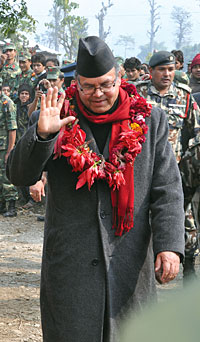 DAMBAR KRISHNA SHRESTHA |
How long have you been reading about "imminent consensus" among political parties in Nepal? Yet after the 16th failed parliamentary elections for a new Prime Minister, bickering goes on and on among the taukays.
So tired have the people been of the netas' interest in their own survival rather than in getting down to the business of completing the constitution that when a Devi Prasad Regmi slapped the "cotton-soft cheeks" of Jhala Nath Khanal, letters to editor sections, Nepali blogosphere and Facebook comment spaces lit up with emotions of approval. Many commentators hailed Regmi as a hero. Some urged that Khanal's peers should also be slapped "for destroying the country".
Slaps may provide temporary relief. But they don't solve long-term problems. Media and civil society can, however, take cues from Regmi's slap to help create a climate of accountability from which even Khanal cannot escape.
What can the media do? It's no secret that Nepali language media is dominated by either political party sympathisers (clue: when you see Madhav Nepal on too many magazine covers, you can guess where the editors' political affiliations lie) or political party aspirants (clue: taukay politicians are given star treatment on talk shows, radio interviews and new analyses).
Such journalists like to impress one another with the demonstration of their access and proximity to politicians. Is it any surprise, then, that headlines and cover stories are all about the same old dysfunctional politics?
In other countries, journalists are adept at routinely re-using news archives to show the contrast between what the politicians said at one point in time, and what they did later. Repeated often, this simple device has an unnerving effect: either the politicians will be proven to be brazen liars who should face electoral wrath or they will end up doing close to what they said they would do.
In either case, by showing the contrast between the past and the present, media can help inject a sense of accountability in the political discourse. Else, politics will continue to be seen as some sort of a flowing river: what happens today is treated as fresh news, with no connection to what the politicians did in recent past. And a chance for the media to champion accountability will be lost.
What can civil society do? Behind every Nepali civil society leader is an NGO in need of funds and support from donors, government and political parties. This is not a cynical observation, but an acknowledgement of the realities of our civil society dynamics. Except for a few who are either retired or wealthy, most such leaders are constrained when it comes to what they can say and do. The result is that their roles become too NGO-fied, with their being more interested in getting along nicely than in acting as public spokespersons.
In such a context, the least civil society leaders can do is not continue to wax eloquent about the platitudes about democracy to the point of mass irritation, but to challenge the politicians to make their visions and pronouncements specific and concrete: will the constitution be written by May? If not, why? What specific ideas do the parties have to stop holding the ambitions of millions of Nepalis hostage just because their leaders cannot get their act together to govern the country? Is it Nepal's destiny to merely be the armpit of land between the fast growing economies of China and India?
There's no point expecting the politicians to strike light and transform themselves: they simply won't change on their own. What can be changed is our collective response to politics in the public sphere through a media and civil society that values accountability over antics.
READ ALSO:
What is the NC waiting for?, DAMAKANT JAYSHI



